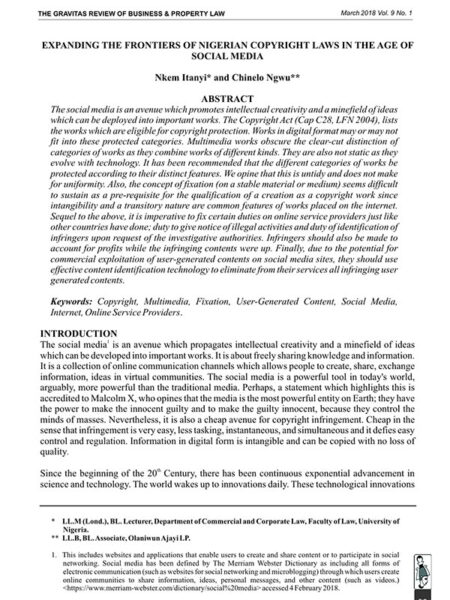-
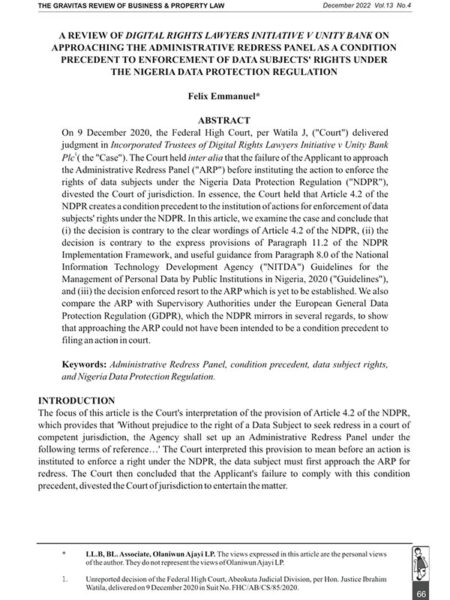
A Review of Digital Rights Lawyers Initiative V Unity Bank on Approaching the Administrative Redress Panel as a Condition Precedent to an Action Under the Nigeria Data Protection Regulation
0₦2,500.00Felix Emmanuel, Associate at Olaniwun Ajayi LP, in his article, A Review of Digital Rights Lawyers Initiative V Unity Bank on Approaching the Administrative Redress Panel as a Condition Precedent to an Action Under the Nigeria Data Protection Regulation, critically examines the decision of the Federal High Court in Incorporated Trustees of Digital Rights Lawyers Initiative v Unity Bank Plc (the “Case”) where the Court held that the failure of the Applicant to approach the Administrative Redress Panel before instituting the action to enforce the rights of data subjects under the Nigeria Data Protection Regulation (“NDPR”), divested the Court of jurisdiction. The Court held that Article 4.2 of the NDPR creates a condition precedent to the institution of actions to enforce data subjects’ rights under the NDPR. Emmanuel masterfully examines all aspects of the Case against the backdrop of relevant laws and regulations.
-
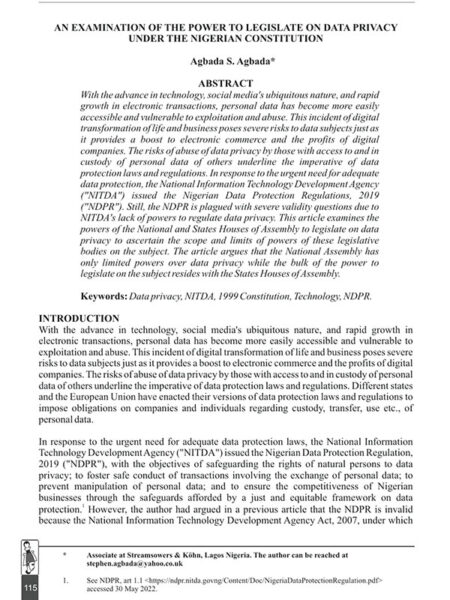
An Examination of the Power to Legislate on Data Privacy under the Nigerian Constitution
0₦2,500.00Stephen Agbada, Associate at Streamsowers & Köhn, in his article, An Examination of the Power to Legislate on Data Privacy under the Nigerian Constitution, notes that in response to the urgent need for adequate data protection, the National Information Technology Development Agency (NITDA) issued the Nigerian Data Protection Regulations, 2019 (NDPR). Does NITDA have the power to regulate data privacy? What is the difference between Data Privacy and Data Protection? Is Data Protection an Exclusive, Concurrent or Residual List item under the Nigeria Constitution? Agbada proffers his views on these pertinent questions in his examination of the powers of the National and States Houses of Assembly to legislate on data privacy.
-
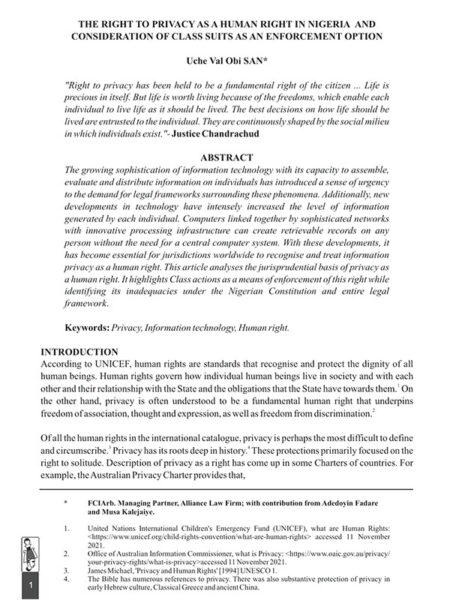
The Right to Privacy as a Human Right in Nigeria and Consideration of Class Suits as an Enforcement Option
0₦2,500.00Uche Val Obi SAN, Managing Partner, Alliance Law Firm, in his article, The Right to Privacy as a Human Right in Nigeria and Consideration of Class Suits as an Enforcement Option, notes that the growing sophistication of information technology with its capacity to assemble, evaluate and distribute information on individuals has introduced a sense of urgency to the demand for legal frameworks surrounding these phenomena. He argues that it has then become essential for jurisdictions worldwide to recognise and treat information privacy as a human right. Val Obi, SAN analyses the jurisprudential basis of privacy as a human right, constitutional and extant legislation on protecting and redressing privacy rights infringement in Nigeria. He highlights Class Action as a means of enforcement of privacy rights while identifying its inadequacies under the Nigerian Constitution and the entire legal framework.
-
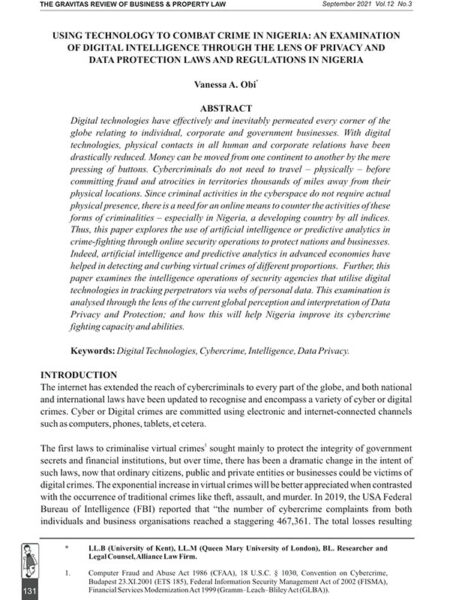
Using Technology to Combat Crime in Nigeria: An Examination of Digital Intelligence Through the Lens of Privacy and Data Protection
0₦2,500.00Vanessa Obi, Researcher and Counsel at the Alliance Law Firm, in her article, Using Technology to Combat Crime in Nigeria: An Examination of Digital Intelligence Through the Lens of Privacy and Data Protection, explores the use of artificial intelligence or predictive analytics in crime-fighting through online security operations to protect nations and businesses. Vanessa examines the intelligence operations of security agencies that utilise digital technologies in tracking perpetrators via webs of personal data. She examines these through the lens of data privacy and protection laws; and how this will help Nigeria improve its cybercrime fighting capacity and abilities.
-
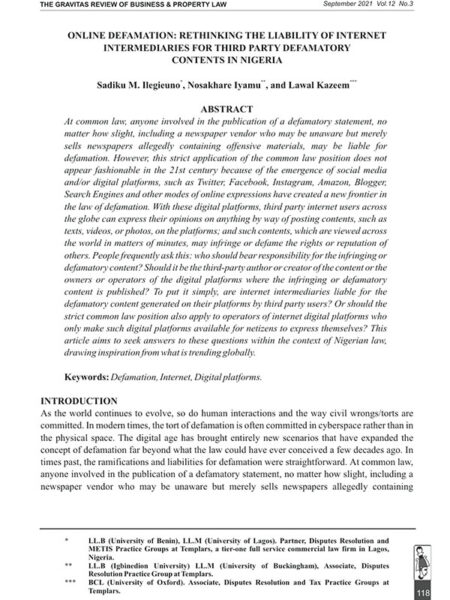
Online Defamation: Rethinking the Liability of Internet Intermediaries for Third-Party Defamatory Contents in Nigeria
0₦2,500.00Sadiku Ilegieuno, Nosakhare Iyamu, and Lawal Kazeem, Partner and Associates respectively at Templars, in their article, Online Defamation: Rethinking the Liability of Internet Intermediaries for Third-Party Defamatory Contents in Nigeria, note that the emergence of digital media has created a whole new category to the original definition of defamation, and the strict definition of the tort at common law has been rendered otiose in application to new media. Sadiku et al examine who bears the liability for defamatory content since several parties are often involved in the publication. Should it be the third-party author or creator of the content or the owners or operators of the digital platforms where the infringing or defamatory content is published? In other words, are internet intermediaries liable for the defamatory content generated on their platforms by third party users? They examine these questions within the context of the common law, the extant laws in Nigeria, and what is obtainable across the globe.
-
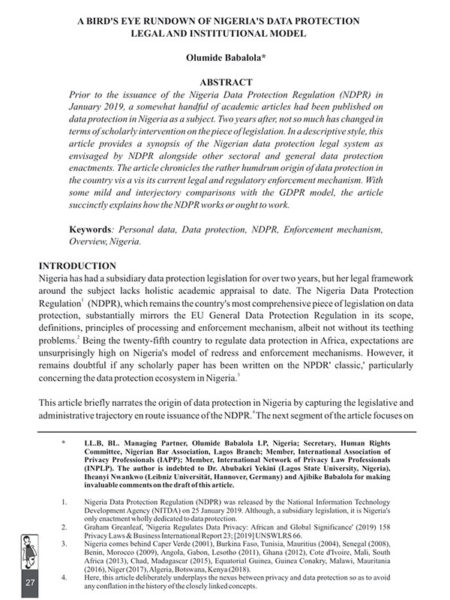
A Bird’s Eye Rundown of Nigeria’s Data Protection Legal and Institutional Model
0₦2,500.00Olumide Babalola of Olumide Babalola LP, in his article, A Bird’s Eye Rundown of Nigeria’s Data Protection Legal and Institutional Model, provides a synopsis of legislation and regulations dealing with data protection in Nigeria. He chronicles the rather humdrum origin of data protection in the country vis-a-vis its current legal and regulatory enforcement mechanism. Through comparisons with the General Data Protection Regulation (GDPR) model, Olumide explains how the Nigeria Data Protection Regulation (NDPR) works or ought to work.
-
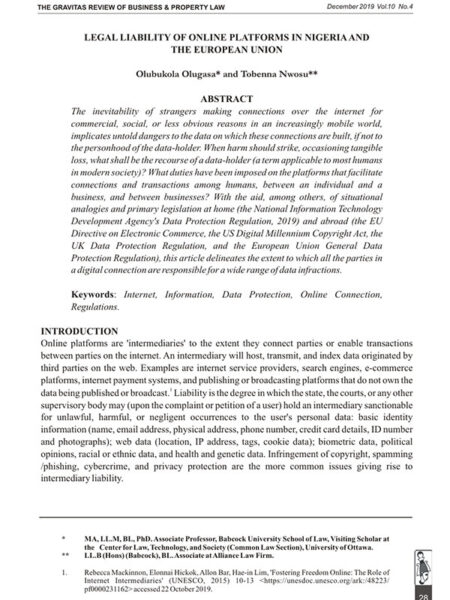
Legal Liability of Online Platforms in Nigeria and the European Union
0₦2,500.00Dr Olubukola Olugasa, Associate Professor of Law at Babcock University, and Tobenna Nwosu in their article, Legal Liability of Online Platforms in Nigeria and the European Union, review the liability of hosting platforms for breach of data privacy and losses arising therefrom. They examine Nigeria’s legal regime on data protection and the EU Directive on Electronic Commerce, the US Digital Millennium Copyright Act, the UK Data Protection Regulation, and the European Union General Data Protection Regulation. The authors delineate the extent to which all the parties in a digital connection are responsible for a wide range of data infractions.
-
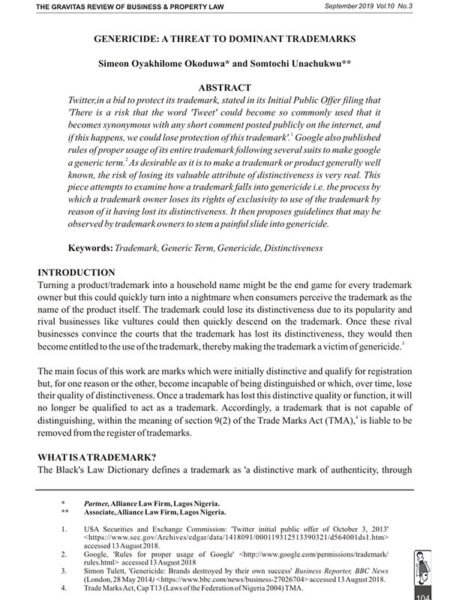
Genericide: A Threat to Dominant Trademarks
0₦2,500.00Simeon Okoduwa and Somtochi Unachukwu of Alliance Law Firm, Lagos Nigeria in their article, Genericide: A Threat to Dominant Trademarks, discuss the generification of trademarks as a result of the loss of distinctiveness. They suggest insightful guidelines that may be observed by trademark owners to stem a painful slide into genericide.
-
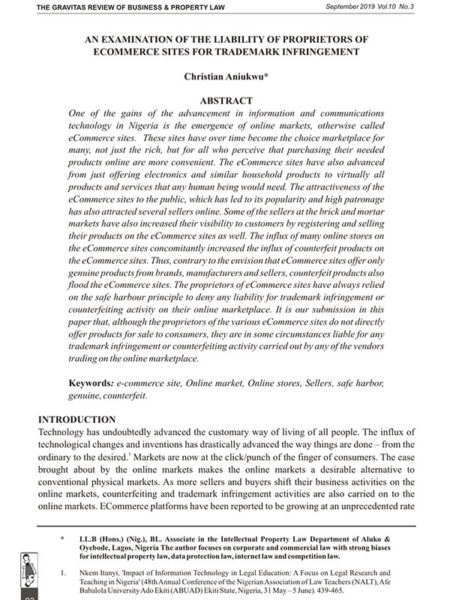
An Examination of the Liability of Proprietors of E-Commerce Sites for Trademark Infringement
0₦2,500.00Christian Aniukwu of Aluko and Oyebode, in his article An Examination of the Liability of Proprietors of Ecommerce Sites for Trademark Infringement, reflects on the emergence of eCommerce, including its convenience and attractiveness, but points to the likelihood of trademark infringement on eCommerce sites which may go without any liability due to the difficulty in tracing perpetrators. He argues that the proprietors of eCommerce sites in some circumstances should be held responsible for trademark infringement on their sites rather than being allowed to avoid liability under the safe habour principle. He discusses practical steps that may be employed in fighting online counterfeiting of brands.
-
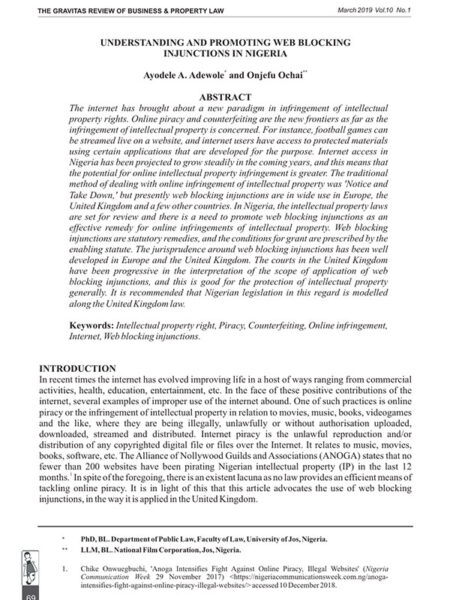
Understanding and Promoting Web Blocking Injunctions in Nigeria
0₦2,500.00Dr Ayodele Adewole of the University of Jos Nigeria,and Onjefu Ochai of the National Film Corporation Jos Nigeria, in their article, Understanding and Promoting Web Blocking Injunctions in Nigeria, observe that the internet has brought about a new paradigm in infringement of intellectual property rights. Online piracy and counterfeiting are the new frontiers as far as the violation of intellectual property is concerned. The traditional method of dealing with online infringement of intellectual property was ‘Notice and Take Down,’ but presently web blocking injunctions are in extensive use in Europe, the United Kingdom and a few other countries where the jurisprudence around web blocking injunctions has been well developed. They observe that the incorporation of measures to deal with online piracy and counterfeiting in Nigeria is long overdue, and web blocking injunctions are the favoured means of achieving this. They recommend reform of Nigerian copyright laws in line with the UK law which has greatly evolved over the course of time.
-
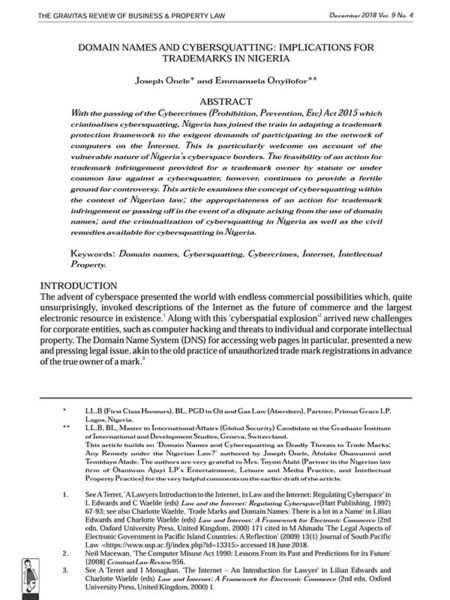
Domain Names and Cybersquatting: Implications for Trademarks in Nigeria
0₦2,500.00Joseph Onele, Partner Primus Grace LP and Emmanuela Onyilofor, Graduate Student at the Institute of International and Development Studies Geneva, in their article, Domain Names and Cybersquatting: Implications for Trademarks in Nigeria, examine the regulation of domain names and the concept of cybersquatting in Nigerian law. They consider the appropriateness of instituting an action for trademark infringement or passing off in the event of a dispute arising from the use of domain names, the criminalisation of cybersquatting as well as the civil remedies available for cybersquatting in Nigeria.
The Gravitas Review of Business & Property Law

